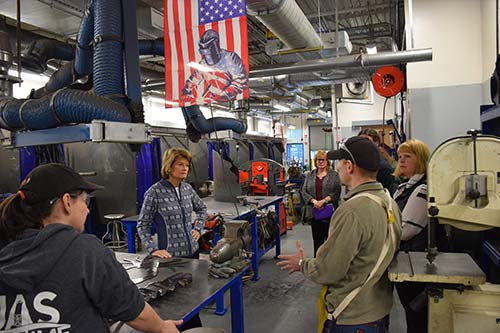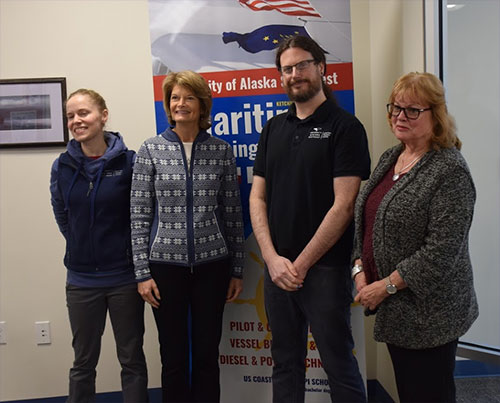
Murkowski Visits UAS Ketchikan Maritime Training Center
March 03, 2020
Sen. Murkowski noted that she was impressed with the facility and the labs, specifically the diesel, welding, and ship simulator labs. The tour was led by professors Mike LaBarge, Mariah Warren, and Larry O’Loane, along with campus director Dr. Priscilla Schulte. LaBarge teaches Maritime Studies, Warren teaches Marine Transportation in Security/Safety/Health, and Larry O'Loane is an Assistant Professor of Power Technology.
Sen. Murkowski expressed support for Alaska’s maritime industry as a whole. She thanked each faculty member for providing "valuable training opportunities for Alaskans." With over 70,000 workers in the state’s maritime industry, nearly all Alaskans depend in one way or another on the maritime economy. The state is highly dependent on shipping for imports of food and other goods, as well as exports for oil, seafood, and minerals. Alaska’s economy is also dependent upon water transport, bringing visitors on cruise ships, managing ports and harbors, traveling on the Alaska Marine Highway ferry system, and maintaining the equipment and machinery essential to villages, towns, and cities.
UAS provides coursework needed to put students on the path to successful maritime careers. Using a combination of seatime and maritime classes taken at either the UAS Ketchikan or Juneau campuses, students can advance from deckhand to third mate. UAS prepares individuals to handle the responsibilities of limited tonnage vessels, and to take on the duties of an officer or owner. With a variety of our lecture courses delivered online, working students can attend class with added convenience. The Qualified Member of the Engine Department (QMED) credential offers a unique opportunity for advancement in the maritime industry, meeting the United States Coast Guard Transportation Worker Identification Credential (TWIC) requirements. Students learn industrial skills that can be applied to occupations in ship building, mining, seafood processing plants and marine engine rooms, as well as other heavy industrial occupations.
Edited By Mary Kauffman, SitNews
Source of News:
|
|||||

